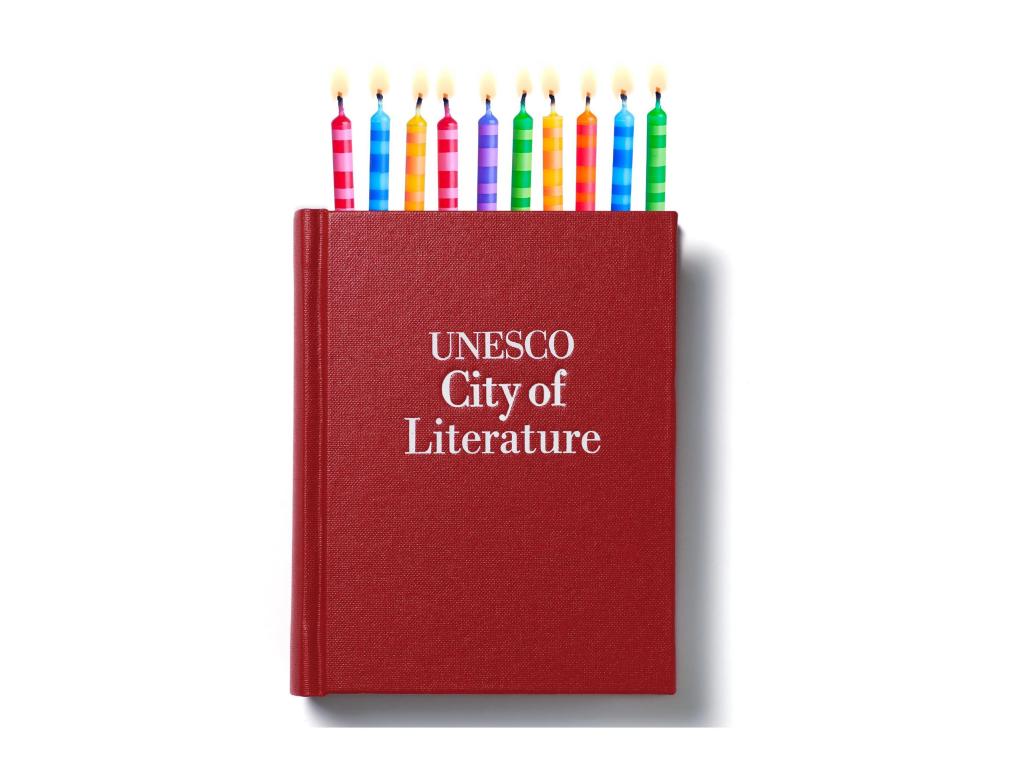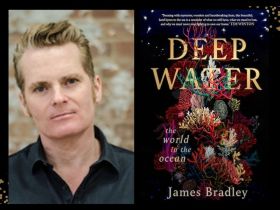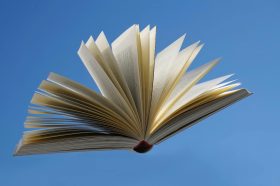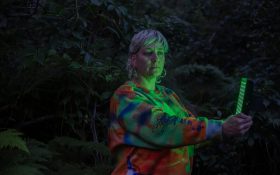Image supplied
In 2008, Melbourne joined the UNESCO Creative Cities Network, becoming Australia’s first City of Literature and only the second such city in the world. The designation was made in recognition of the breadth and depth of Melbourne’s literary activity, which encompasses everything from in-conversations in bookshops, libraries and at literary festivals, to spoken word performances, independent publishers and literary magazines.
‘It’s a reflection of the fact that Melbourne is a reading city and a writing city and all that that entails,’ poet and writer Maxine Beneba Clarke said of Melbourne’s designation as a UNESCO City of Literature.
A love of literature is written into Melbourne’s DNA, with the State Library of Victoria – Australia’s oldest public library and one of the first free public libraries in the world – established in 1854. A more recent addition to the city is the Wheeler Centre for Books, Writing and Ideas: a literary hub housed in the State Library’s southern wing.
Establishing the Wheeler Centre was a central plank of Melbourne’s winning bid for UNESCO recognition as a City of Literature.
As well as providing a home for a range of local literary organisations, including the Melbourne Writers Festival, Writers Victoria, Emerging Writers Festival, Express Media and the Small Press Network, the Wheeler Centre presents an annual program of panels and discussions – effectively tying the many threads of literary Melbourne together into a continuous conversation.
Director of the Wheeler Centre, Michael Williams, said the organisation’s role came into focus during its first year of programming, shortly after it opened its doors to the public in 2010.
‘One of the bits of shorthand that people used to use about us was “Oh it’s like a year-round writers’ festival.” But that never felt quite right to us. The problem we always had was that we were there to celebrate the book, but we were at arms’ length from the book. And actually, the moment that shifted for us, in our very first year of programming, was when we came to appreciate the extent to which conversation was an inherently literary art form in and of itself,’ he said.
‘We rarely think of public conversation as an art form but as soon as you do, it’s hard to escape the idea that this is an intensely literary and in a way a very old fashioned pursuit. We have always set up our communities and our societies and our civic engagement around a gathering point for people to talk.
‘By finding ways to casualise intellectual engagement and curiosity, the Wheeler Centre embeds the idea of being a literary citizen in the people of Melbourne’s lives,’ Williams explained.
Later this month, the Wheeler Centre – in partnership with the Melbourne UNESCO City of Literature Office – will celebrate Melbourne’s ten-year anniversary of becoming a City of Literature through a range of public programs and conversations.
Looking back at the last decade, Williams said: ‘What’s happened in the 10 years since the designation I think is that we’ve become better at making, at seeing and articulating the links between the extraordinary organic activity that’s going on in the community. It might be zine culture or it might be book clubs or libraries, it’s all part of a wider fabric; a kind of woven quilt of literary activity.’
Today, the wider fabric of literary activity Williams refers to has international reach thanks to the activities of the Melbourne City of Literature Office, and its focus on fostering connections and partnerships across the global Creative Cities network .
David Ryding, Director of the Melbourne City of Literature Office, represents Melbourne on the world stage through the UNESCO Creative Cities network, which now includes 28 Cities of Literature, ranging from Edinburgh to Bagdad, Seattle to Lillehammer.
Since the Melbourne City of Literature Office was established in 2014, Victorian writers have undertaken residencies in partnership with literary cities including Prague and Iowa; Victorian librarians and translators have received travel grants to help build international networks; and Melbourne delegates have travelled to Edinburgh International Book Festival as part of an ongoing, festival-focused exchange program.
Such activities aren’t just focused on representing Melbourne’s literary sector on the world stage; they’re also strengthening capacity and broadening our offerings at home.
‘The breadth of literary activity in Melbourne is incredible,’ said Ryding, ‘but we also have an aspiration for equity and inclusion across literature which is shown through so many things. Over the last 10 years where people have seen there’s a gap, they’ve tried to fix it – the Stella Prize, 100 Story Building, Speculate Literary Festival – there’s a whole range of examples where the community stepped up to make things better – and that sense of community is so integral to Melbourne being a City of Literature.’
Melbourne’s strengths as a City of Literature lie in this broader ecosystem, and the world is taking notice. ‘The fact that American bookshops are following the “Love your bookshop day” model which was developed by Joel Becker at ABA [the Australian Booksellers Association] – shows we’re very good at what we do,’ Ryding said.
Change for the better
Looking back on the ten years since Melbourne became a City of Literature, Maxine Beneba Clarke notes that Australian writers now seem more globally connected and celebrated than they were a decade ago, while the sector as a whole feels more cohesive. She’s also seen greater acceptance of the diversity of literary activity across the sector.
‘I think there’s been a lot of schemes, particularly for emerging writers – things like The Next Chapter, where in the past you may have only been able to submit a novel or a non-fiction manuscript, they’re now open to graphic novels or to a poetry manuscript or open to short fiction. And I think that has come out of looking at all of these events in the context of the City of Literature,’ Clarke said.
Marian Blythe, Director of the Homecooked Comics Festival, said: ‘Melbourne’s literary sector – which definitely includes comics and zines – has come leaps and bounds over the last decade when it comes to diversity and representation. I’m not saying it’s anywhere near perfect, but the Australian comics scene (and the world’s, for that matter) has historically been heavily dominated by white men, and over the last few years in particular there has been a huge increase in autobiographical stories about women, race, sexuality, identity, disability, and mental illness.
‘I think social media and the digital space has had a lot to do with that – people are now more easily able to “find their tribe” online, and as traditional media ownership becomes more concentrated, they’re seeking out independent voices. Comics have always been a place for political and subversive content, and we need that now more than ever,’ said Blythe.
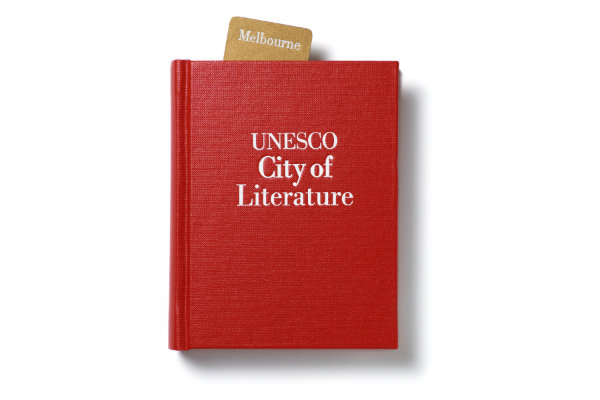
Image supplied.
Leesa Lambert is the co-owner of The Little Bookroom, a Carlton-based bookshop specialising in books for children. She too has witnessed significant changes in the local literary sector since Melbourne became a UNESCO City of Literature.
‘Ten years ago the global financial crisis had just hit and the whole book industry was in a state of fear. Our connections with the British publishing industry really influenced the books we were seeing coming into the market and so there was a lot of conservative publishing there. And I think that those dark days actually allowed local publishers to step into the gaps and turn to our local economy, which didn’t suffer as greatly in the financial crisis, to step up,’ Lambert said.
As well as seeing a correction in the market which has allowed more local writers to flourish, Lambert said the past decade has seen renewed confidence in local booksellers.
‘We’re moving into a period of growth where the book industry in Melbourne specifically feels stronger – we’re not thinking about how we’re going to get through this month, or this year; we’re thinking about where we could be in five years or ten years, and what do we want in the future? And it’s been such a joy to see that transition in the last ten years,’ she told ArtsHub.
Looking forward
Predicting the future is an uncertain art, as hindsight quickly reveals. Ten years ago, pundits were predicting the death of the book in printed form, given the rising popularity of e-books. Today, book sales remain strong while e-book sales are declining. And while everyone was busy worrying about e-books’ impact on the market, no-one predicted the rise of podcasts, which came seemingly from nowhere to become one of the dominant narrative forms of the early 21st Century.
So what does the future hold for Melbourne as a City of Literature? Where will we be in another ten years?
Clarke thinks the coming decade will be fascinating. ‘Because at the end of it we’re talking about 20 years of being a City of Literature – and that’s a whole new generation of writers, and they’re writers who are growing up in a different age – to sound really old!’ she laughed.
‘We’re talking about making Twitter stories and making Snapchat stories and all that kind of thing, and I think what that also allows is the City of Literature concept to be taken more globally in terms of work that can be accessed by anyone, anywhere.’
Clarke hopes the success of the City of Literature will also encourage more adventurous writing and publication over the next decade.
‘Someone said to me recently that television has been completely reinvented with the decline of free to air – we have all of these online series that just gain massive popularity, but a similar thing hasn’t actually happened to the book. So I guess I would love to see more adventure, more risk-taking in publishing – and a literature that can actually be disseminated vastly, effectively, and hopefully with fair recompense to the author as well,’ she said.
The Little Bookroom’s Leesa Lambert echoes Clarke’s thoughts regarding the readers of the future.
‘I think that we really are raising a generation of strident book lovers and they’ll be in their early 20s – they’ll be young adults in another 10 years’ time and I think we will just have an extraordinary readership to converse with and participate in our events. I think they’re incredibly self-motivated, quite entrepreneurial young people and I can’t predict what they will make happen but I know they’ll make it happen,’ Lambert said.
‘And I really hope that we will see more recognition of picture book art in Australia too. Also I hope that we will see more family friendly events at writers’ festivals and in our bookish cultural hubs as well – that’s something that we need to address, and I’m sure we will in the next 10 years, no doubt,’ she laughed.
Marian Blythe also thinks the future looks bright. ‘Not only are there a bunch of new artists telling ground-breaking stories, but there are a number of micro-publishers popping up, as well as exciting developments in web-comics, and bookstores are definitely embracing more diverse comics,’ she said.
‘I’m excited about what crowdfunding and micro-publishing will bring to the local comics scene … The stories being told by Australia’s talented comic artists and zine-makers are worth sharing, and I hope that more people embrace them,’ Blythe said.
David Ryding from the City of Literature Office also hopes to see greater engagement with Melbourne’s diverse storytellers over the next ten years.
‘Melbourne is changing – we’ve had a doubling of the Indian population, we have a huge Chinese population, we have the Horn of Africa migrants. We have newer storytelling traditions coming through, and we know – because we are very focused through our funding and profit margins – who we are selling to and who our audience is. But we have not asked the question, “who could our audience be?” And I think that’s the challenge,’ he said.
Whatever happens over the next decade, some things will never change, said the Wheeler Centre’s Michael Williams.
‘Readers love to be surprised by amazing writing, and our City of Literature is producing extraordinary stories and extraordinary storytellers at a rate of knots, and that doesn’t feel like it is going anywhere,’ he said.
The Wheeler Centre’s Our City of Literature program runs from 28-30 November. Visit www.wheelercentre.com for details.
